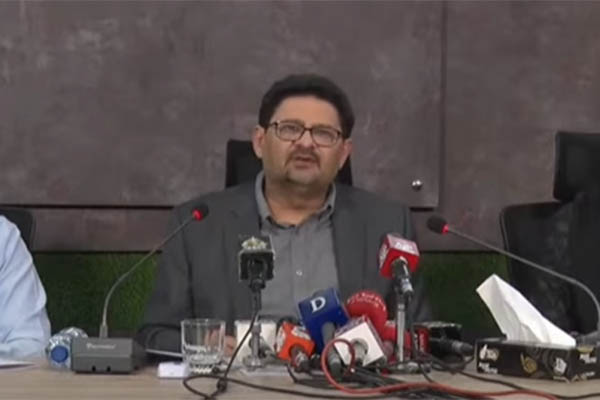
Screengrab of Finance Minister Miftah Ismail’s late-night press conference
The ruling coalition on Friday slammed the opposition Pakistan Tehreek-e-Insaf (PTI)’s attempt to jeopardize the IMF loan program” mere days before the global lender’s Executive Board is set to meet and sign off on the latest tranche, with Finance Minister Miftah Ismail questioning if the Khyber-Pakhtunkhwa government prefers “to destroy the country” if Imran Khan does not return to power.
Addressing a late night press conference alongside Information Minister Marriyum Aurangzeb and Coordinator to the P.M. on Economy Bilal Kayani, he slammed the PTI for putting the national economy at stake at a time the country was already reeling from the devastation of flooding due to ongoing rains. “The country is submerged with floods and you [KP government] are writing a letter regarding the IMF program,” he said, referring to a letter made public by KP Finance Minister Taimur Jhagra in which he had said the provincial government would not adhere to a previously ratified agreement with the IMF.
In his letter to the federal finance minister, Jhagra said the Khyber-Pakhtunkhwa government was withdrawing from its commitment to attain a financial surplus in the current fiscal—a key demand of the IMF—because of various issues, including a budgetary allocation for the erstwhile tribal area; commitment to monthly net hydel profit transfers; and costs linked to monsoon floods.
Regretting that the KP government’s actions suggested it wished to “destroy the country” if PTI chief Imran Khan were not in power, Ismail said that while Jhagra had assured him the letter had been forwarded to the IMF, it was widely available on social media and would undoubtedly be considered by the Executive Board.
Noting that a day earlier, PTI leader Chaudhry Fawad Hussain had said the governments of Punjab and KP would “force” early elections by refusing to cooperate with the federal government on the IMF deal, the minister said Jhagra’s letter had endorsed these views. “Can we please stop doing politics ahead of the IMF Executive Board meeting,” he stressed, reiterating the importance of $1.2 billion tranche for a stable economy. “Do you want the country to default?” he questioned, adding that Pakistan was no single person’s country and every Pakistani should be working for its betterment.
“Could you not wait for 10 days?” he questioned the KP government on the timing of the letter, adding that he would personally meet Jhagra on Monday to discuss the issues highlighted in the letter.
Joint statement
In a joint statement issued by the ruling coalition, the component parties lashed out at the Khyber-Pakhtunkhwa government for “playing politics” as a “ploy to plunge Pakistan into a flood of economic crisis.” Stressing that Khan’s government had inked the initial agreement with the IMF that the incumbent rulers had to adhere to, they lamented that not only had he violated the deal and gotten the program suspended, but had also laid “landmines” for the new government by giving subsidies that had brought the country to the brink of default.
Emphasizing that the ruling coalition had been forced to take difficult decisions to save Pakistan from default, it said persistent efforts of four months had paid off with the value of the rupee and the economic condition starting to improve. While the people are still “drowning in the four years of economic disaster and the deluge of inflation” caused by Khan, they said, KP’s decision to write the letter just three days before the IMF Executive Board meeting on Aug. 29 suggested “bad intentions.”
Claiming the letter had proven that a “foreign-aided party” was actively seeking the economic destruction of Pakistan, the statement vowed that this conspiracy would be defeated and the economic sovereignty of Pakistan protected.
“As at this time assistance and rehabilitation of the flood-affected people should be a national priority. We will not let the operation, of saving lives of flood-affected people and mitigation of their difficulties, fall prey to politics,” it added.
Earlier, Ismail said Pakistan had fulfilled all prior actions required by the IMF and would hopefully receive its next tranche after the board meeting. Rejecting reports of the government planning to sell New York’s Roosevelt Hotel, which is owned by Pakistan International Airlines, or the airline itself, to Qatar, he said there had been no discussions in this regard.
The Gulf nation, he said, was primarily interested in long-term leases to manage Pakistan’s airports, constructing terminals at ports, LNG plants and large-scale solar farms, adding an investment in the stock market was also under consideration.
